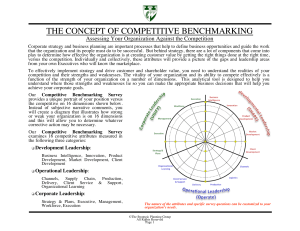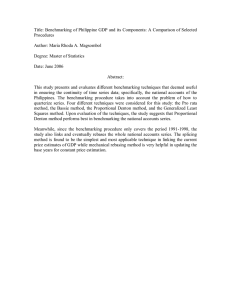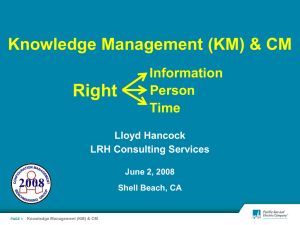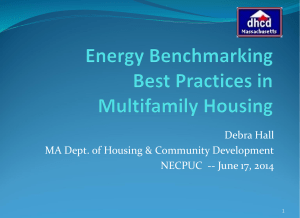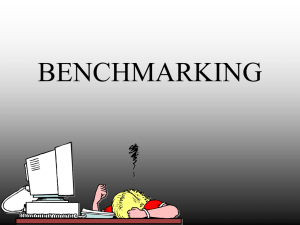Fact Sheet EnErgy Data accElErator Why are Benchmarking and Data Access Important?
advertisement
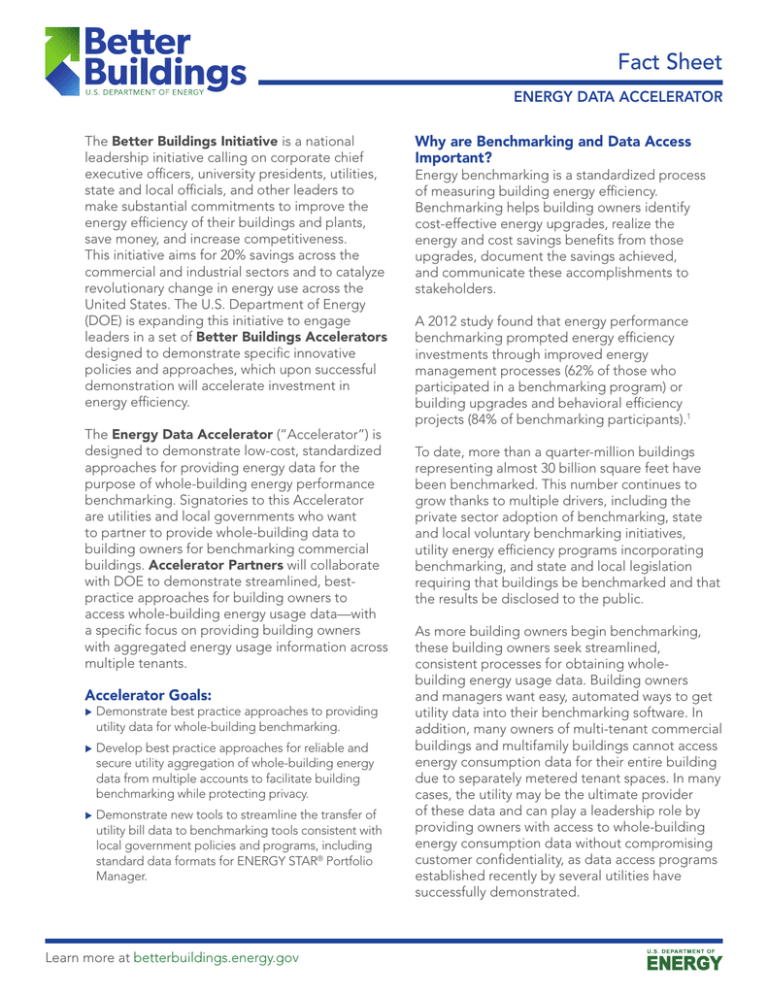
Fact Sheet Energy Data Accelerator The Better Buildings Initiative is a national leadership initiative calling on corporate chief executive officers, university presidents, utilities, state and local officials, and other leaders to make substantial commitments to improve the energy efficiency of their buildings and plants, save money, and increase competitiveness. This initiative aims for 20% savings across the commercial and industrial sectors and to catalyze revolutionary change in energy use across the United States. The U.S. Department of Energy (DOE) is expanding this initiative to engage leaders in a set of Better Buildings Accelerators designed to demonstrate specific innovative policies and approaches, which upon successful demonstration will accelerate investment in energy efficiency. The Energy Data Accelerator (“Accelerator”) is designed to demonstrate low-cost, standardized approaches for providing energy data for the purpose of whole-building energy performance benchmarking. Signatories to this Accelerator are utilities and local governments who want to partner to provide whole-building data to building owners for benchmarking commercial buildings. Accelerator Partners will collaborate with DOE to demonstrate streamlined, bestpractice approaches for building owners to access whole-building energy usage data—with a specific focus on providing building owners with aggregated energy usage information across multiple tenants. Accelerator Goals: uu Demonstrate best practice approaches to providing utility data for whole-building benchmarking. uu Develop best practice approaches for reliable and secure utility aggregation of whole-building energy data from multiple accounts to facilitate building benchmarking while protecting privacy. uu Demonstrate new tools to streamline the transfer of utility bill data to benchmarking tools consistent with local government policies and programs, including standard data formats for ENERGY STAR® Portfolio Manager. Learn more at betterbuildings.energy.gov Why are Benchmarking and Data Access Important? Energy benchmarking is a standardized process of measuring building energy efficiency. Benchmarking helps building owners identify cost-effective energy upgrades, realize the energy and cost savings benefits from those upgrades, document the savings achieved, and communicate these accomplishments to stakeholders. A 2012 study found that energy performance benchmarking prompted energy efficiency investments through improved energy management processes (62% of those who participated in a benchmarking program) or building upgrades and behavioral efficiency projects (84% of benchmarking participants).1 To date, more than a quarter-million buildings representing almost 30 billion square feet have been benchmarked. This number continues to grow thanks to multiple drivers, including the private sector adoption of benchmarking, state and local voluntary benchmarking initiatives, utility energy efficiency programs incorporating benchmarking, and state and local legislation requiring that buildings be benchmarked and that the results be disclosed to the public. As more building owners begin benchmarking, these building owners seek streamlined, consistent processes for obtaining wholebuilding energy usage data. Building owners and managers want easy, automated ways to get utility data into their benchmarking software. In addition, many owners of multi-tenant commercial buildings and multifamily buildings cannot access energy consumption data for their entire building due to separately metered tenant spaces. In many cases, the utility may be the ultimate provider of these data and can play a leadership role by providing owners with access to whole-building energy consumption data without compromising customer confidentiality, as data access programs established recently by several utilities have successfully demonstrated. Benefits to Accelerator Partners uu Develop additional technical tools and/or assistance as necessary to meet the goals of the Accelerator, subject to resources. uu Help your commercial and multifamily building owners achieve greater energy and cost savings A growing body of experience demonstrates a link between benchmarking, customer participation in utility programs, and energy performance improvements— suggesting strongly that owners and operators that benchmark their buildings are more likely to pursue and achieve energy savings than those who do not benchmark. To this end, the National Association of Regulatory Utility Commissioners (NARUC) has recognized the value of benchmarking for energy and demand reduction, increased cost-effectiveness in utility program portfolios, cost savings for customers, and system-wide benefits.2 Developing best practices on whole-building aggregation will allow multifamily and multi-tenant buildings to benefit from benchmarking in the future. uu Provide recognition to Accelerator Partners for their leadership in addressing these issues. Local Government and Utility Partner Commitment The local government is dedicated to partnering with their utility to do the following: uu Engage with local stakeholders to outline and refine best practices approaches for access to energy data in support of whole-building benchmarking, with an initial convening occurring in the first six months. uu Work with DOE and other Accelerator Partners to identify within 12 months, one or more approaches for whole-building data aggregation that could be piloted in their community; within 24 months, implement the pilot to make whole-building data available for at least 20% of multifamily and/or commercial buildings in the local community. uu Better insights into how buildings are performing in your city or service territory By enabling building owners to benchmark their buildings on a whole-building basis, utilities and cities may also be able to glean insights into the performance of buildings in their local jurisdictions and service territories and better inform their own energy efficiency programming. uu Share results and lessons learned with DOE and other Accelerator Partners as approaches are implemented, such as materials developed for building owners in the local community on how to access energy data from their utility. uu Access tools and resources on data access and benchmarking Accelerator Partners can gain access to tools, analyses and resources that lay out potential technical solutions for providing whole-building data, including practices and analysis that can help to protect tenant privacy. uu National recognition Receive national recognition from DOE for demonstrating your energy efficiency commitment to building owners in your city or service territory by providing whole-building data access. Raise the visibility of your efficiency efforts with building owners. DOE Commitment to Energy Data Accelerator Partners DOE is dedicated to helping Accelerator Partners streamline the process of providing energy data to building owners interested in benchmarking. uu Provide technical assistance associated with SEE Action guides such as “A Regulator’s Guide to Data Access for Commercial Building Energy Performance Benchmarking.” uu Provide analytical support to develop reasonable thresholds for data aggregation. Learn more at betterbuildings.energy.gov For More Information: Better Buildings: http://energy.gov/better-buildings SEE Action Working Group on Commercial Buildings: http://www1.eere.energy.gov/seeaction/existing_ commercial.html A Utility Regulator’s Guide to Data Access for Commercial Building Energy Performance Benchmarking: http://www1.eere.energy.gov/ seeaction/pdfs/commercialbuildings_data_access_ guide.pdf 1 NMR Group, Inc. and Optimal Energy, Inc., Statewide Benchmarking Process Evaluation, Volume 1: Report, April 2012. www.energydataweb.com/cpucFiles/pdaDocs/837/ 2 National Association of Regulatory Utility Commissioners. (2011). Resolution on Access to Whole-Building Energy Data and Automated Benchmarking. Accessed May 1, 2013: http:// www.naruc.org/Resolutions/Resolution%20on%20Access%20 to%20Whole-Building%20Energy%20Data%20and%20 automated%20Benchmarking.pdf.
